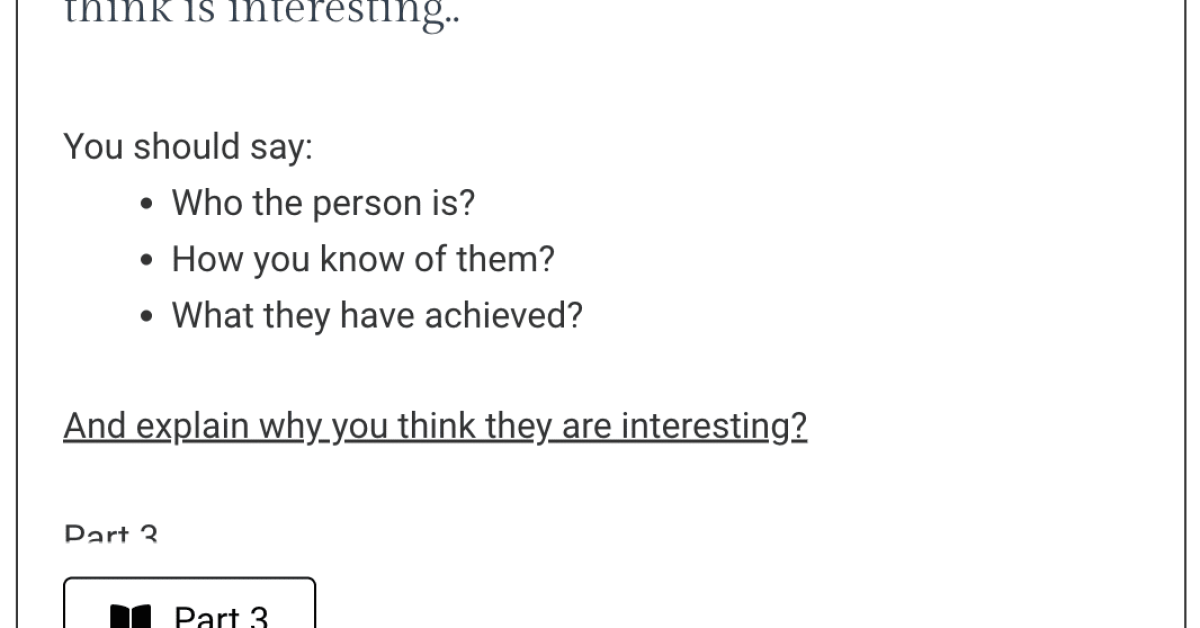The topic card – IELTS speaking part 2.
So, you’ve completed Part 1 of the IELTS speaking exam, and its time to move on to Part 2. Of course, the examiner will inform you of this.
“Now I’m going to give you a topic card and, ask you to talk about it for one to two minutes.” You’ll have one minute before you speak to think about what you’re going to say, and you can make some notes on this piece of paper if you want.
When the examiner hands you the topic card, carefully examine it and, above all, take note of the grammar required for each of the questions on the card. Some topics will necessitate the use of more than one tense, which is important to remember when speaking.
Prepare for any topic, and don’t waste time worrying that you were given a difficult or irrelevant topic.
All of the topics are broad enough for any candidate to discuss in depth. If you get a topic that is related to something you are not interested in, you can use your imagination to make up a story if necessary. The examiner doesn’t care if it’s true or not because they’re only here to test your English ability.
If you don’t understand something on the topic card, don’t hesitate to ask the examiner before it’s your turn to speak.
After your one minute is up, the examiner will tell you that you can now begin discussing your topic and will notify you when your time is up. You should speak for 1.5 to 2 minutes. You can, of course, look at the topic card and your notes to help you speak, but try to make eye contact with the examiner as well, and don’t always have your head down. If you continue to speak after 2 minutes, the examiner will most likely stop you because they must be mindful of the time, and the examiner stopping you is nothing to be concerned about.
After you finish speaking, the examiner may ask you one or two quick follow-up questions about what you said, or he or she may simply move on to part 3. If you are asked any follow-up questions, you only need to give a brief response.
Understanding the topic card in part 2.
Describe a famous person who you think is interesting.
You should say
Who this person is.
How you first knew of this person
What this person has done
And explain why you think this person is interesting
When most IELTS students look at a topic title like this, the first thing they see is “famous person,” and they miss out on a very important key word, usually an adjective.
The topic above is not to describe a famous person, but rather to describe a famous person you find interesting. The topic card’s final question will ask you to explain why you think this person is interesting. Almost every topic will have a key word or adjective like this in the title, and it’s critical to remember it and use it when you speak. I would advise you to repeat this key word up to 5 or 6 times as you speak. It will not only help you stay on topic, but it will also make it appear less like you just prepared a speech about a famous person.
Sometimes students ask if they have to answer all of the questions on the topic card, and I would say yes, because it keeps you on topic and makes it easier for the examiner. Having said that, try to answer the questions in a natural manner, and avoid sounding like you’re only answering 4 or 5 questions. Try to keep your topic like a short story. The final question on the card will always be, “Explain why, how, or what,” and it is critical to answer this question.
Decide what to talk about
After reviewing your topic card and noting any necessary grammar and key words, it is time to quickly decide what you will discuss. Because you only have one minute to prepare, it is not a good idea to spend too much time thinking about this, as you will run out of time and your score will suffer as a result.
If you are given a topic for which you cannot think of an experience to discuss, you will have to use your imagination to make up a portion of it. For instance, your topic could be to describe an older person you admire. Perhaps you can’t think of an older person you admire, but you almost certainly know one, so make up some reasons why you admire this person. I would only do this if absolutely necessary, because it is always easier to speak the truth.
Another thing to consider when deciding what to talk about is whether you will have enough to say about your chosen topic. Do you have the vocabulary or lexical resources to discuss it? I’ve seen students make poor decisions here and end up unable to discuss their choices. This is something to keep in mind while studying for the exam and reviewing all of the current part 2 topics.
Always try to make your topic personal and express your emotions and feelings when speaking about it. For example, if your topic is to describe a famous person, choose someone you really like or admire and try to reflect that in your speech.
See all the Part 2 topics



































